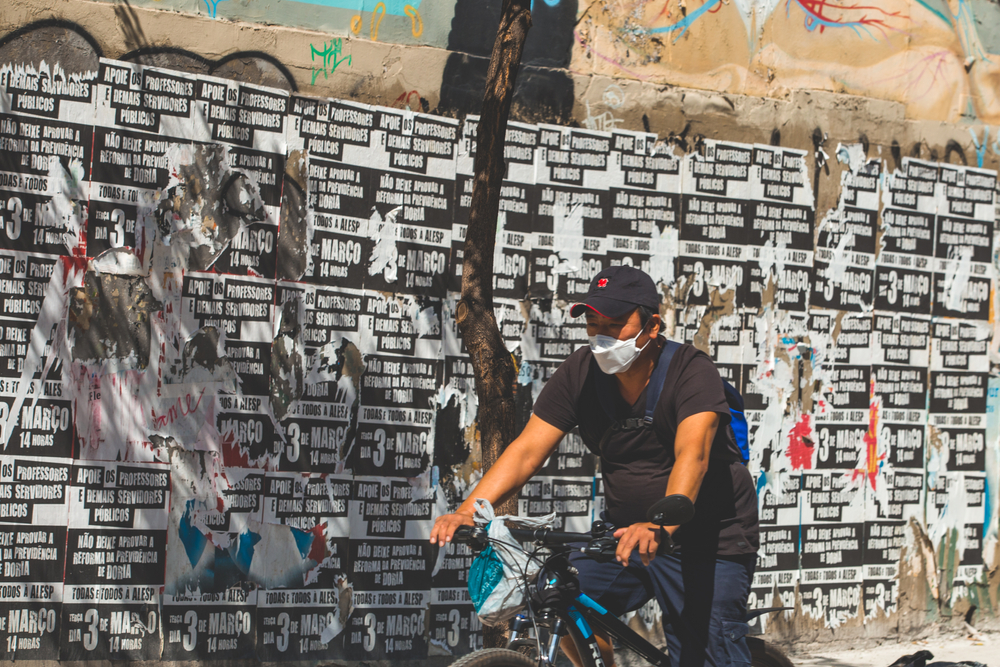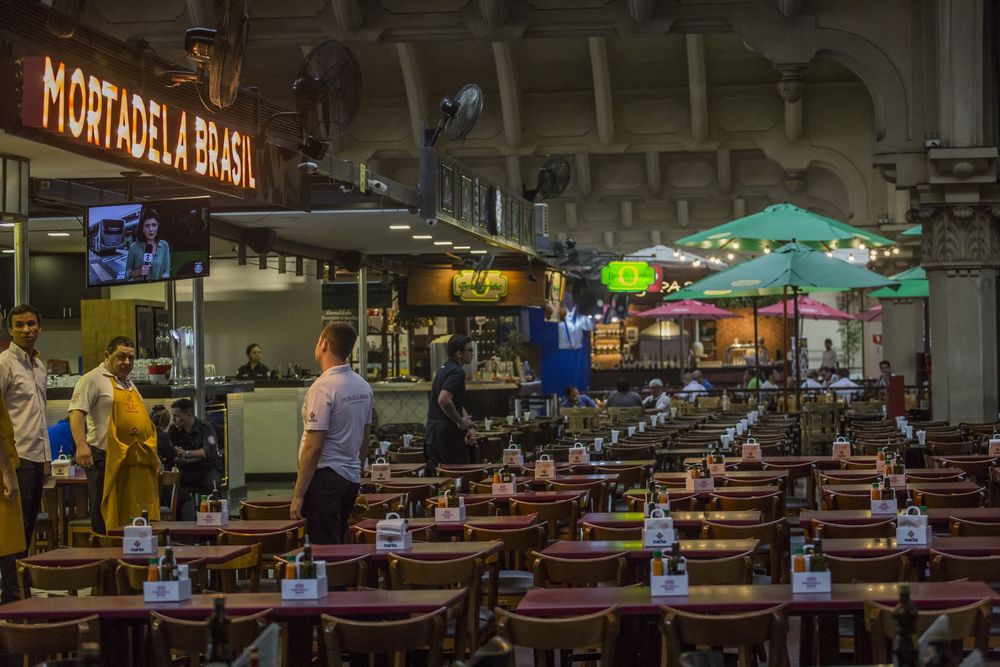RIO DE JANEIRO, BRAZIL – With the advancing coronavirus pandemic and the isolation rules, many businesses succumbed to the crisis and were forced to permanently close their doors. In São Paulo, little by little, the “for rent” signboards multiply throughout the city’s landscape, exposing the consequences produced by the economic shutdown.
In the virtual world, social media publishes announcements about the closure of venues that struggled to survive and adjust to the “new normal” imposed by Covid-19, but were unable to continue.
The gastronomic sector was one of the most heavily impacted. Of São Paulo’s 23,000 bars and restaurants, over half -12,000- have closed, according to the Brazilian Bar and Restaurant Association (ABRASEL). “Right at the beginning of quarantine, I realized that the flow in the restaurant would be zero and that we wouldn’t be able to survive without revenue. We were already at our limit. With no choice, we had to close down,” says Ana Massochi, owner of La Frontera, which had been operating since 2006 on the outskirts of the Consolação cemetery in the capital’s central region. Massochi even tried to negotiate the rent with the proprietor to ease the costs somewhat, but she was unsuccessful. Since then, a “for rent” plaque has been hanging outside the premises.
With the closure of the restaurant in April, 22 employees were dismissed and joined the unemployment line in the country during the pandemic. By late May, 7.8 million jobs had been lost in Brazil, according to the IBGE.

Massochi managed to keep only two employees, who were transferred to her other Argentine food restaurant, Martín Fierro, which has been operating for four decades. “We are trying to survive, to keep the flame burning amid the pandemic. We first adjusted by operating only with delivery services and now we reopen under the new reopening protocols, with only 40 percent capacity. But we haven’t been able to cover even half of the costs,” she laments.
For months she has been trying to secure a loan from the National Support Program for Microenterprises and Small Businesses (PRONAMPE) announced by the government: “At the bank, they say that we are in line, that there is a document missing, we are in a battle for the government to release this credit so that we won’t close. If we don’t succeed, I’ll make new cuts in the restaurant,” she explains.
Growing line seeking credit
The entrepreneur’s difficulty in securing a credit line is no exception among those trying to keep businesses afloat in the midst of economic turmoil. At the Brazilian Micro and Small Business Support Service (SEBRAE), services to small businesses tripled during the pandemic months. In the list of applications, there are questions as to why the credit pledged by the government is not coming through: “The government announces many figures, but it doesn’t explain how people can get them. We are helping people not to give up. People are drowning, they can’t ask for such a complicated list of requirements, they have to throw a float to help them,” says SEBRAE-SP’s superintendent director.
In just under a month, the PRONAMPE granted virtually the entire R$15.9 billion guarantee initially planned. The resource enabled loans to about 218,000 companies, according to data from the Ministry of Economy. The portfolio itself accepted that the amount was not enough to meet all the small businesses that need credit to survive the pandemic. Since the start of the pandemic, over 700,000 companies have permanently closed; 99.8 percent of them were small businesses, according to the IBGE. The Pulse Company Survey: Impact of Covid-19 on Companies, also showed that only 12.7 percent of companies had access to emergency government credit for salary payments.
The PRONAMPE serves microenterprises with annual revenues of up to R$360,000 (US$72,000) and small companies with sales of up to R$4.8 million. The funds can be used to pay salaries or for other operating costs. The maturity is 36 months, with an eight-month grace period and interest equivalent to the basic rate (SELIC) plus 1.25 percent per year. The federal treasury covers up to 85 percent of any default (through the Operations Guarantee Fund – FGO) and the risk on the remaining 15 percent is borne by the lending bank.
With the line of entrepreneurs seeking loans on the rise, Congress released an additional R$12 billion for the program on July 30th. The money was expected to be available to banks as of Monday, August 17th, and the credit will again “end very quickly” according to Antonia Tallarida, under-secretary of Micro and Small Business Development at the Ministry of Economy. In the first round of loans, ten financial institutions operated the PRONAMPE. However, among the large banks, only Caixa, Banco do Brasil and Itaú joined the program. In the second round, Bradesco and Santander should also be involved.

The resources available from the government, in PRONAMPE and other programs, however, will still be scarce, according to a study by the Getúlio Vargas Foundation (FGV), which estimates that R$202 billion will be needed this year to meet the demand for credit spurred by the impacts of the pandemic.
The resources announced by PRONAMPE do not even reach 20 percent of demand. Furthermore, private banks will not expedite credit at this time if there is no guarantee from the government. On the contrary, they will step on the brake. “For the credit channels to remain open for these small companies, the government’s action is required; there is no other way,” explains Lauro Gonzales, coordinator of the Center for Studies in Microfinance and Financial Inclusion at FGV and one of the study’s authors.
Gonzales believes that, within the group of small companies, the smallest are at a greater risk of dying during the pandemic, since they face even greater difficulty in accessing credit. The researcher also estimates that given the uncertainty surrounding the duration of the pandemic, there may be an increase in the number of companies that will no longer be able to “hold on for long”.
“There are two tools to fight the crisis: credit and emergency aid. It will be the future of these policies that will outline the economy’s path. On the credit front, there is a shortfall, which in the coming months may lead to a greater collapse of companies. Even more so in a scenario of lower consumption, with the end of the emergency aid,” he adds.
Rafael Augusto, 35, a resident of Jardim Colombo in the Paraisópolis favela complex, in the south zone of São Paulo, was one of the thousands of small entrepreneurs who had to throw in the towel when faced with the crisis. He considered that not even a loan application could save his business, which was his only source of income. Augusto and a partner owned a parking lot next to the US Consulate in São Paulo.
But since the start of the pandemic and with the suspension of interviews for visa applications, clients disappeared. “The rent of the place was very expensive, with no money coming in there was no way to continue paying. As we don’t know when people will be able to travel to the US again, it would be too risky to ask for credit and run into debt, creating an even bigger problem.”
Now he and his wife, who works as a community worker in Jardim Colombo’s Basic Health Unit (UBS), live off her salary. While he can’t get a new job, Rafael is betting on courses to improve his knowledge of business administration. “For now, we’re tightening the budget and getting by. Sometimes we need to lose before we win, isn’t that right?” he says, hoping the job market will start to improve.
Source: El Pais

